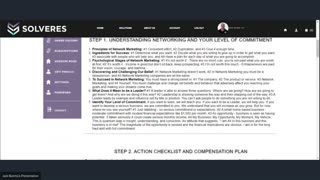SALNEG
SALNEG
Salary negotiation is a crucial part of the job offer process that allows you to discuss and potentially increase your compensation package before accepting a job offer. Here are some steps and tips to consider when negotiating your salary:
1. Research:
Understand the typical salary range for your role, industry, and location. Websites like Glassdoor, Payscale, and LinkedIn can provide insights into average salaries. This information will help you set a reasonable and informed target salary.
2. Wait for the Right Moment:
Don't bring up salary too early in the interview process. Wait until you've received a job offer or the employer shows serious interest in hiring you.
3. Consider the Entire Package:
Remember that salary is just one part of the compensation package. Consider other benefits like health insurance, retirement contributions, bonuses, stock options, and flexible work arrangements.
4. Know Your Worth:
Highlight your skills, experience, and accomplishments that make you a valuable candidate for the role. Be prepared to discuss how you can contribute to the company's success.
5. Practice Your Pitch:
Prepare a confident and concise pitch that explains why you deserve a higher salary. Practice delivering this pitch so that you're comfortable discussing it during the negotiation.
6. Be Positive and Respectful:
Approach the negotiation with a positive attitude. Emphasize your enthusiasm for the position and the company. Be respectful and professional in all your communications.
7. Be Open and Flexible:
While it's important to have a target salary in mind, be open to a range. This flexibility shows that you're willing to work together to find a mutually beneficial solution.
8. Wait for Their Offer:
Let the employer provide the first salary offer. This gives you a starting point for negotiation. If they ask for your salary expectations first, you can offer a range based on your research.
9. Counteroffer Professionally:
If the initial offer is below your expectations, express gratitude for the offer and then counter with your preferred salary range, supported by your research and qualifications.
10. Negotiate Benefits and Perks:
If the employer is unable to meet your desired salary, consider negotiating other benefits such as additional vacation days, professional development opportunities, remote work options, or signing bonuses.
11. Be Patient:
Negotiations might take some time. Be patient and allow the employer to review your counteroffer.
12. Evaluate the Final Offer:
Once you receive their revised offer, evaluate it carefully to ensure it aligns with your expectations and needs. If it does, you can accept it. If not, you can continue negotiating or decide whether to walk away.
13. Stay Professional:
Throughout the negotiation process, maintain a professional and positive demeanor. Even if negotiations break down, leave a good impression for potential future opportunities.
Remember that negotiation is a two-way street. Both you and the employer want to arrive at a fair and mutually beneficial agreement. Approach the process with confidence and preparation, and be ready to advocate for your worth.
https://noblegoldman.com/register/?sk=AfChjAVxY
#class #learning #opportunity
-
 1:28
1:28
rfreedoms
2 months agoSOLVERES TRAINING
7 -
 1:35
1:35
BrandiDesautels
8 months agoThe Salary Negotiation Knowledge Party
14 -
 10:12
10:12
Barry Zalma, Inc. on Insurance Law
1 year agoClaims Commandments
18 -
 1:12
1:12
Malovabay77
1 year ago"Sodexo: Where the only thing that's balanced is the food on the trays!"
14 -
 1:03
1:03
SWNS
1 year agoAmericans believe companies should be more transparent in their job postings
26 -
 8:18
8:18
SoulPurposeInsights
1 year agoThe Salem Which Trials. Is THIS A Past Life of Yours??
17 -
 4:18
4:18
GetPayroll
2 years ago $0.01 earnedPreparing for an Interview - The interview Process Part 1
39 -
 12:08
12:08
AV
9 months ago#65 Job Advertisement
5 -
 1:07
1:07
SWNS
1 year agoAmericans willing to go back to school for a career switch
19 -
 8:18
8:18
Roamingdesk
1 year agoAccount Executive – Remote Working – Software Permanent City of London, London
10